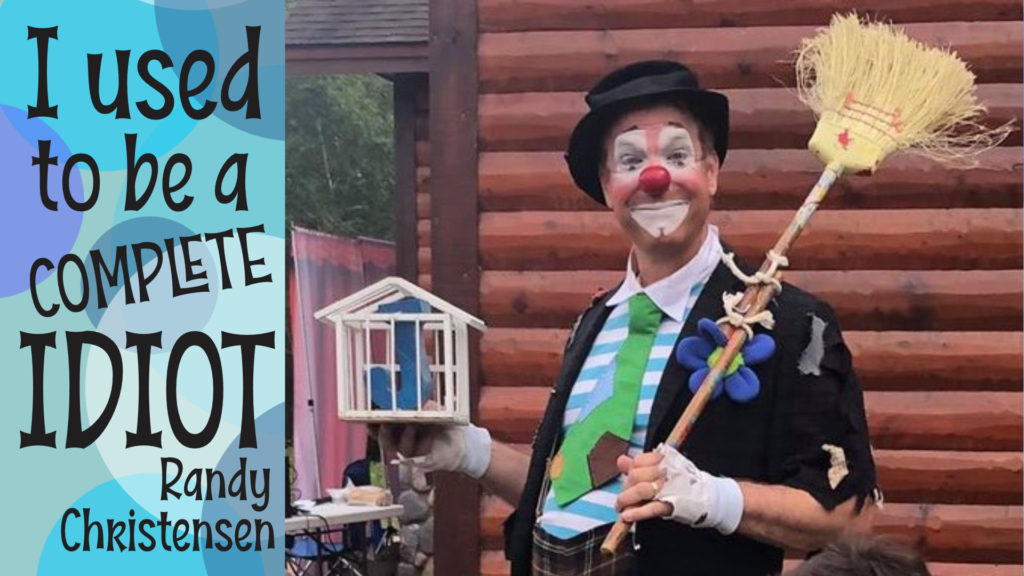
Yes ma’am, I used to be a complete idiot…while clowning, that is. I have been clowning since the Fall of 1980 and have learned a lot over the past 42 years. But at the beginning, I had the idea that “complete character” meant that I had to be one-dimensional. If I was going to be an idiot, I was going to be a total idiot!
Early on, my character―Simon De Clown―would not understand what people were trying to explain no matter how hard they tried. This was frustrating and exasperating for my audience. Simon De Clown spoke in such a consistently obnoxious fashion that after a few minutes, my audience was ready to move on, and move away! Janet Tucker shared with me, in retrospect, that there were times she felt that Simon De Clown came across as a person with mental handicaps that would not be overcome. He was hopeless.
Well, Simon De Clown grew up. First, I had to realize that my relationship with my audience was more important than my preconceived ideas about what my character should be. Simply, I needed to be approachable, loving and lovable, not stifled inside my own prescribed “character box.” Giving my audience what they wanted from a character was more important than me maintaining my militant mindset. That meant that I needed to minimize the “total idiot” part of my clowning. I listened to people, rather than come in and dominate them. Soon, I found that people who even HATED clowns would talk with me, because I treated them with respect rather than as if I were a total idiot.
Something else I now consider is the amazing condition/occurrence called “autistic savant.” We saw this type of unique brain function in the movie “Rain Man.” Dustin Hoffman played a character that did not function in the “normal” realm of society, yet had an incredible ability to tabulate numbers, equations, etc.
We have heard of learning disabled individuals who can hear a song, then sit down at a piano, and without one music lesson, play the song beautifully and completely. This is an example of autistic savant (formerly termed, “idiot savant.”) It shows that every person, though challenged in certain areas, has some ability at which he may excel!
Clowns may display that irony. The clown walks onto the stage with three juggling balls. He drops one. While trying to pick it up, he hits his head on the prop table. He wobbles and drops another ball. He bends over to pick them up and his hat falls off. But, after a few more moments of ineptitude, we see him juggling five clubs flawlessly! How can this be? He can’t walk onto a stage without tripping, yet he juggles? Amazing!
I’ve found that my audience wants me to succeed. The audience doesn’t simply want to watch me fail and fail and fail. They want to see me do it! They want me to conquer my problems and be a winner!
Some state, “Well, I’m just a clown, so I don’t have to juggle, or do a magic trick well, or actually play an instrument, etc. People expect me to fail.” Friend, that is a shallow understanding of the clown. Our audiences don’t want us to be complete idiots and failures. They want to cheer us on to success!
A clown may show the struggles of life through his routines with all the temporary setbacks and failures, but he should also show that there is hope! And he shows that by eventually succeeding in his endeavors.
So, in closing, I encourage you to:
1. Allow your character to modify and grow. Don’t box yourself in, but allow yourself to be multi-dimensional.
2. Be aware of how your character is perceived by your audience, not just by yourself. You are clowning for THEM, not just for yourself.
3. Minimize or exaggerate specific character traits to fit the situation. Don’t always be exactly the same, because each audience is different. (i.e., a nursing home audience differs from a class of fourth-grade boys.) Make adjustments to make it a better experience for your audiences.
4. Develop skills so that you can display success. Don’t be satisfied with only failing! Your audience wants to cheer you on!
